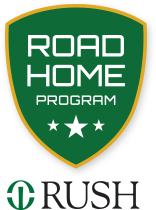PSYCHOLOGY POSTDOCTORAL FELLOWSHIP
Qualifications – Postdoctoral fellows will have a doctoral degree in Clinical or Counseling Psychology from an APA-accredited program including completed coursework, dissertation, and internship requirements prior to beginning the position.
Time Commitment – The postdoctoral fellowship is full-time, Monday through Friday from 9 am to 5 pm, for one year.
Application Requirements – For a complete application, please include a cover letter that describes your careers goals and how Road Home Program can facilitate your continued professional development as well as dissertation status, CV, and two letters of recommendation.
Deadline to apply for the 2026-2027 training year is December 23rd, 2025.
Following the American Psychological Association guidelines on postdoctoral training in psychology, we conceive of the postdoctoral year not as a time to further develop generalist skills, but rather as a time to refine specialized skills.
This fellowship develops high-level competency in Cognitive Processing Therapy (CPT) for PTSD as well as other competencies necessary for functioning as a doctoral-level psychologist on an interdisciplinary team in an academic medical center. Fellows’ clinical training occurs mainly in the context of our two-week ATP.
This ATP differs from many other PTSD programs both in the amount and frequency of trauma-focused treatment, with veterans receiving individual CPT sessions twice per day (i.e., massed-treatment). Thus far, our research has demonstrated that 80% of veterans in the ATP achieve clinically significant reductions in PTSD and Depression symptoms, with nearly 50% of participants no longer meeting criteria for PTSD at discharge.
Additionally, the majority of veterans complete the full ATP, with fewer than 10% drop out (Held et al., 2019; Zalta et al., 2018). Available data suggest that treatment gains are maintained at 12-month follow-up (Held et al., 2019). During the training year, fellows can expect to complete at least 20 individual CPT protocols and 2 courses of CPT and DBT group psychoeducation as well as provide short-term intervention focused on MI and DBT skills to support individuals in the ATP. Further, fellows will complete comprehensive intake assessments that include a psychosocial history, self-report measures, a records review, and diagnostic interviews. Fellows’ ATP training experiences are distributed equally across combat and MST cohorts.
Although the bulk of the fellow’s time will be dedicated to clinical duties on the ATP, fellows are encouraged to keep a small caseload of four to six outpatient cases. Road Home Program outpatient clinic serves veterans and their family members throughout Chicagoland and Illinois. Our clinic emphasizes the use of short-term evidence-based interventions in individual therapy.
Depending on interest and availability, group psychotherapy is sometimes offered and fellows are welcome to co-facilitate a group of their choice. In the past, Road Home Program has offered groups for MST, Cognitive Processing Therapy (CPT), substance use, sleep hygiene, Dialectical Behavior Therapy (DBT) skills, family support, trauma-informed yoga, art therapy, and mindfulness.
Individual supervision is provided weekly by licensed psychologists at Road Home Program. Additionally, group supervision is provided biweekly by the Training Program Manager, Joel Wyatt.
Postdoctoral fellows may have the opportunity to provide tiered supervision of psychology externs.
PSYCHOLOGY EXTERNSHIP
Qualifications – Psychology externs must be enrolled in an APA-Accredited doctoral level Clinical or Counseling psychology program prepared to participate in an Advanced Externship placement.
Time Commitment – The psychology extern will be at Road Home Program at least 16 hours each week from 9 am to 5 pm. Availability on Wednesdays is required to accommodate didactics and supervision.
Application Requirements - For a complete application, please include a cover letter that describes your careers goals and how Road Home Program can facilitate your continued professional development, CV, unofficial transcript, and two letters of recommendation.
Deadline to apply for the 2026-2027 training year is January 23rd, 2026.
The bulk of an extern’s time will be spent carrying an OP caseload of eight to ten cases. Road Home Program’s clinic serves veterans and their family members throughout Chicagoland and Illinois. Road Home Program emphasizes the use of short-term evidence-based interventions in individual therapy.
Depending on interest and availability, group psychotherapy is sometimes offered and externs are welcome to co-facilitate a group when available. In the past, Road Home Program has offered groups for MST, Cognitive Processing Therapy (CPT), substance use, sleep hygiene, Dialectical Behavior Therapy (DBT) skills, family support, trauma-informed yoga, art therapy, and mindfulness.
Our ATP differs from many other PTSD programs both in the amount and frequency of trauma-focused treatment, with veterans receiving individual CPT sessions twice per day (i.e., massed-treatment). During the training year, externs can provide short-term interventions focused on MI and DBT skills to support individuals in the ATP. In addition, externs will complete comprehensive intake assessments that include a psychosocial history, self-report measures, a records review, and diagnostic interviews for both OP and ATP veterans.
NEUROPSYCHOLOGY POSTDOCTORAL FELLOWSHIP
The Neuropsychology Service at Rush University Medical Center has one postdoctoral fellowship opening for the 2024 – 2026 training cycle. This program participates in the ABCN match process. The fellowship is a joint position between the Neuropsychology section of the Department of Psychiatry and Behavioral Sciences (60%) and the Road Home Program: The Center for Veterans and Their Families at Rush (40%).
The fellow in this joint track typically spends 3 days per week in the Psychiatry and Behavioral Sciences section and 2 days per week in the Road Home Program. Clinical work typically will occupy about half to two-thirds of your time, with supervision, didactics, intervention, and research taking up the balance.
Throughout the fellowship, the fellow is mentored in neuropsychology by Drs. Christopher Grote, Suzanne Musil, and Joyce Tam in the Department of Psychiatry and Behavioral Sciences. At the Road Home Program, Dr. Brianna Werner facilitates the fellow’s integral role and functioning within an interdisciplinary team.
Please contact Dr. Grote for additional details and how to apply.
